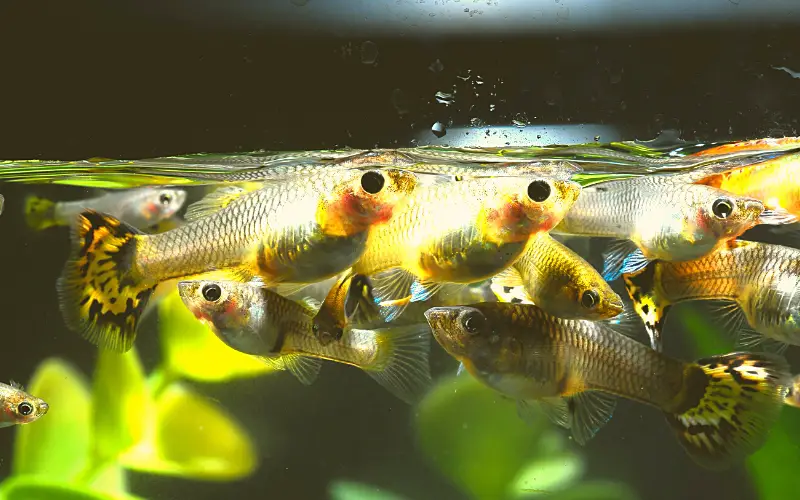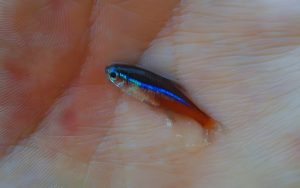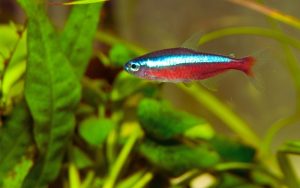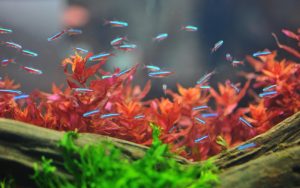Are you seeking answers to the commonly asked question: How long does guppy live? Guppies are a popular choice of fish for both beginners and experienced aquarists alike, but proper care is necessary for these vibrant little fish to have quite a short lifespan.
Aquariums are an enjoyable and soothing way to bring a bit of nature inside your home, but having such peaceful fish come with some unique challenges.
One of the biggest knows how long you can expect your guppies to live.
Many fish keepers suffer from this issue and make the mistake of thinking their guppies will last a lifetime.
Unfortunately, as with any pet, it’s essential to understand that they won’t stay young forever.

Thankfully, you can take some easy steps to significantly extend your guppies’ life – from tank setup to diet tips. In this article, we will provide seven essential tips on how to prolong the life of your guppy so they can thrive in their home aquarium.
So, how long do guppy fish live? Keep reading to learn about giving your guppies the best chance of living a long, happy life!
Table of Contents
ToggleHow Long Does Guppy Live as Pets?
How long does a guppy live in captivity? Guppy lifespan in tank can be longer than in the wild. Wild guppies have a typical lifespan of around two years, while those kept as pets often live for 3 to 5 years – and sometimes even longer!

Proper care is the most significant factor in determining how long your guppy will live. The healthier your fish are, the more likely they’ll be to survive in the long run and live out their entire lifespan.
7 Tips for Prolonging Guppy Lifespan
1. Get the Right Tank Setup
The best way to ensure your guppies have a long, healthy life is by having an aquarium that meets all their needs. Ensure the tank is large enough for the number of guppies you have, and keep their water clean and filtered.
2. Provide Ideal Water Parameters
An essential part of tank maintenance is keeping water parameters at the ideal levels for guppies. This includes temperature, pH, hardness, and more. Test your aquarium water regularly to ensure it’s safe for your fish.
3. Feeding Quality Food to Your Guppies
Guppies are omnivores, so they must be fed high-quality fish food rich in protein and designed explicitly for their nutritional needs. Avoid providing too much – or too little – and choose a food appropriate for their size.
4. Keep Your Guppies with Peaceful Tank Mates
Guppies are social creatures that do not like living alone. Guppies can get very stressed if they are kept with aggressive tank mates and consider their food sources. Fin Nipper’s aggressive fish should never go out of their way because the wild guppies will chase the guppies in search of a bite out of their flowing tail. So, bring a few small and peaceful tankmates, and you’ll be fine.
5. Use A Tank That’s Big Enough
Overcrowding can cause significant stress on fish. Even the shoaling species need plenty of room, and you have to give the guppies an ample size. Guppies have a small body that can grow between 1″ and 2″. The 10-gallon tanks will be enough to accommodate a small five-fish population.
If you wish to get more guppies, add 1g of water per 1 inch of fish unless they breed prolifically. Wild Guppies swim between upper and lower water levels, and gullies love to swim together. A longer rather than larger tank provides a suitable setting for a healthy, social little fish.
6. Provide Hiding Places
Small fish have some difficulty hiding away from the other species of guppies in their aquariums. Males usually stress female guppies, but they have to find shelter. It’s worth the thicker plants that grow in the cave or the woods.
The floating plants in the tanks make a great addition because they make an excellent place to hide from the tiny guppy fry until the adults have a decent appetite.
7. Creating a Stress-free Environment for them
Ensure everything works for your guppy fish in an enjoyable environment. All you need to do is maintain the tank, feed them with quality food, and provide enough space for your guppies to swim. Also, keep the tank clean and free of ammonia and nitrite.
Following these tips can give your guppies an excellent and healthy environment. This will help ensure that your guppies can live their entire life span and give you the most enjoyment possible from having them as pets.
Is It Hard to Keep Guppies Alive?
Keeping guppies alive is surprisingly easy! They are one of the hardest and most robust aquarium fish, so even if you’re a beginner to keeping fish, they make a great choice.
The only requirements for keeping these little beauties alive and thriving are clean water (good filtration is critical!), healthy guppies food (less is more—overfeeding can cause problems), proper tank size based on the number of guppies you have, and regular water temperature checks (since they’re tropical fish, they prefer warmer waters).
Guppies should be relatively easier to keep alive than other aquatic fish species!
What Can We Do to Ensure Long Guppy’s Lifespan?
How do I guarantee my pet’s lifelong health? The key to ensuring guppies have a long lifespan is providing them with the right environment. This means ensuring their tank has plenty of space, a responsible food supply, and suitable water quality.
To ensure their tank makes a suitable home, it should be at least 20 gallons (75.7 liters) for two or three guppies and five gallons (18.9 liters) for each additional guppy fish in the fish tank after that.
This gives them enough room to swim around without feeling cramped or stressed out, which can cause issues like premature death due to stress-related diseases.
The pH level should stay consistent between 7 and 8 as much as possible, with temperatures not above 79 degrees Fahrenheit (26 degrees Celsius).
To help keep things balanced, you may need to use an aquarium heater if necessary and aeration equipment such as air stones or filters for extra oxygenation in case there isn’t enough natural airflow where your fish tank is located since some areas of the world are too cold to support these fish in winter months.
Healthy nutrition should also be part of any responsible plan for keeping your guppies healthy over time; they do best on high-quality fish flakes with complimentary live food like brine shrimp once every couple of days, depending on how large your colony size is!
Lastly, regular partial water changes are required every week or two to ensure no build-up of harmful toxins from ammonia build-up, which can drastically shorten your guppy’s lifespans if left unchecked.
How Much and How Often Should You Feed Your Guppies?
It’s essential to feed them only a little. Overfeed can cause health problems and shorten fish’s lifespan. Feed the guppy fish what they’re able to clear out within an hour. Uneaten foods should be taken from your tanks through a slit to avoid rotting in your soil.
Please feed the guppies two times daily and give them various snacks. Give your dogs eggs or frozen food at night, for example.
NOTE: Do not overfeed your guppy fish. It takes time for the fish to adjust to their new diet, so be patient and oversee them when you start your feeding routine.
How Long Do Guppies Take to Grow?
Like many other fish species, guppies have a relatively short lifespan and proliferate. The time it takes to reach full size depends on the species, but most guppies will reach maturity within six months. Sometimes, it can take them as little as three months to get their adult size.
Male guppies tend to grow faster than female guppies and will also reach sexual maturity sooner. The average adult size for male guppies is about 2 inches (5 cm) in length, while female guppies tend to be slightly larger, reaching an average size of 2.5 inches (6 cm).
The Ideal Growth Requirements for Guppies in the Aquarium
Guppies are a hardy fish species and can often survive in various aquarium conditions. Still, they need specific ideal growth requirements to ensure they reach their full potential and live long and healthy life.
- Guppies need plenty of space to swim around and explore, preferably a tank that is 20 gallons or larger.
- The pH level in their tank should also remain consistent between 7 and 8, and the water temperature should not exceed 79 degrees Fahrenheit (26 degrees Celsius).
- An aquarium heater can ensure the fish tank is adequately oxygenated, and aeration equipment such as air stones or filters should be added.
- Healthy nutrition is also essential; they do best on high-quality flakes with complimentary live food like brine shrimp once every couple of days, depending on your colony size.
- Lastly, regular partial water changes are required every week or two to avoid the build-up of harmful toxins from ammonia build-up.
By following these basic guidelines, you can ensure your guppies reach their full potential and live long, and healthy fish lives.
Why Are My Guppies Dying?
Unfortunately, guppies can die for various reasons; some of the most common include improper water quality, inadequate nutrition, and insufficient tank size.
It’s essential to check the water quality a few times a week using an aquarium test kit to ensure the pH, nitrate, and ammonia levels are within the ideal range for guppies.
Additionally, ensure you’re feeding your guppies various high-quality foods, including flakes and live food like brine shrimp.
Finally, ensure that your tank size is appropriate for the number of guppies you have; it needs to be at least 20 gallons and should increase with the size of your colony.
Are Guppies Ok in Hard Water?
Yes, guppies can survive in hard water. However, it is essential to maintain good water quality and provide plenty of oxygen to the tank with an aquarium heater and aeration equipment.
It is also essential to do regular water changes to keep the pH levels in the ideal range. Additionally, it is vital to feed your guppies high-quality food and provide them with plenty of space to swim.
By following these basic guidelines, your guppies should be able to thrive in a hard water aquarium.
Can 1 Guppy Live Alone?
No, guppies must be kept in groups of at least three or more. While a single guppy can survive alone in a tank, they are social creatures and will thrive when kept with other guppies.
In addition to companionship, having multiple guppies in the tank helps to reduce stress levels and make them feel secure. A single guppy fish can become easily stressed, leading to poor health and even death.
For this reason, it is best to keep guppies in groups of at least three or more. Doing so will help ensure they are happy, healthy, and live long lives.
How Long Do Male Guppies Live?
The average lifespan of a male guppy is 1-2 years, depending on their living conditions. Proper diet and care are essential for these fish to reach their maximum life expectancy.
To ensure they live as long as possible, house your guppies in an aquarium with clean water that is regularly tested and filtered and a water temperature between 73-81 degrees Fahrenheit.
Feeding them small amounts of high-quality food two to three times daily will also help keep your guppies healthy throughout their lifetime.
Do Male or Female Guppies Live Longer?
Although some male guppies manage to defy the odds, on average, they have a much shorter lifespan than their female counterparts – typically lasting no more than two years compared to females, who often make it three or beyond.
The main contributing factor to this difference is their breeding habits. Since female wild guppies are not constantly reproducing, they have a better chance of living longer.
On average, male wild guppies have a lifespan of between one and two years, while female guppies have a lifespan of up to five years. This difference in longevity is likely due to their different reproductive strategies.
Male guppies put much of their energy into seeking mates and competing with other aggressive fish – activities which are very energy intensive and thus cause accelerated wear-and-tear on the body over time, shortening the overall guppies lifespan.
On the other hand, female guppies focus more on finding good nesting sites and avoiding predators or aggressive males – allowing them to live longer than their male counterparts.
How Long Do Guppies Live Without Food?
How long do guppies live without eating? Guppies can live without food for up to 14 days, provided they can access clean and well-oxygenated water. This is due to their body’s ability to store energy reserves that support them for two weeks without nutritional intake.
During this time, guppies also enter a dormancy that helps conserve energy until food becomes available again.
However, it is essential to note that extended periods of fasting should be avoided as this can lead to malnutrition and poor health. Therefore, feeding your guppies various nutritious meals two to three times per day is best.
Commonly Asked Questions about the Lifespan of Guppy Fish (FAQ)
How Long Do Feeder Guppies Live?
Feeder guppies typically live for 2-5 years. Like other fish, they usually have an average life expectancy, but some may live longer. It all depends on how much care and attention they receive from their owner.
What Is the Lifespan of a Guppy fish?
How long does guppy fish live? The lifespan of guppies is quite impressive, considering the average guppy’s lifespan is 2-3 years. Proper care, nutrition, and companionship can help increase their lifespan.
How Old Is the Oldest Guppy in the World?
The longest-living guppy fish ever recorded is believed to be seven years old. This fish was owned by an aquarium worker in London and lived in a tank kept and maintained by the worker.
How Old are Guppies at Pet Stores?
Guppies that can be purchased in pet stores are usually aged 24-48 hours or even days. This is because the fish are bred in large numbers and sold as soon as they reach a certain age.
How Long Do Store-Bought Guppies Live?
How long does guppies live in pet stores? Store-bought guppies can live for about 1-2 years, depending on their living conditions. Proper diet and care ensure they live as long as possible. They can even live up to five years or longer with adequate supervision.
What are the Best Guppy Fish Tank Water Conditions?
All guppies samples in the study were stored within tropical freshwater fish tanks at 72 ° Fahrenheit and 90° Celsius. During this period, the lamps were kept in constant light conditions. It’s essential to feed them different foods. Generally, baby brine shrimp, worms, and vegetable pallets will be available in the pet store or stores.
How Often Do Guppies Have Babies?
Guppies can reproduce every two to four weeks. The female guppy fish will lay anywhere from 20-100 eggs at a time, depending on her size and age. With proper care and nutrition, the guppy fry should be able to survive in the tank.
How Long Do Guppies Stay Pregnant?
Guppy fish breeding time can vary depending on the species, but the gestation period for guppies is usually between twenty-one and thirty days. The female guppy will start giving birth to the fry within two weeks of mating.
How Long Can Guppies Live in a Small Tank?
How long do guppies live in small aquariums? Generally, guppies can live between 1-2 years in a small tank. It is important to note that the fish tank size should be appropriate for their needs. Regular cleaning and water changes are necessary to ensure they have the best habitat possible. Feeding them a balanced diet with the proper nutrients and vitamins is vital to extend your guppies lifespan.
How Long Can a Guppy Live Out of Water?
A healthy adult guppy fish can typically survive out of water for up to 10 minutes. This is because the fish’s gills allow it to absorb oxygen from the air for some time. However, the fish will become stressed for extended periods and eventually die. To avoid this, you should always keep your guppies in an area with lots of clean water that has been well-oxygenated.
How Fast Do Baby Guppy Fish Grow?
Baby guppies grow incredibly fast. In an ideal environment, they can reach full size in as little as six months with a good diet and plenty of room to swim. However, some individual guppies can take closer to a year before reaching their adult size.
Conclusion
So, how long do guppy live? Taking care of your guppies can be an exciting and rewarding experience. Providing them with the right environment, quality food, and proper lighting and cleaning their tank regularly can help ensure they live a long and healthy life. As you know, how long guppies live depends on many factors, such as their living conditions, diet, and genetics.
Also, remember that females tend to outlive males by several months. If you plan on keeping both sexes of guppies in your aquarium, ensure the male-to-female ratio is appropriate so they all get along. Ultimately, adopting a guppy is more than just buying a pet; it’s about taking responsibility for another life and providing your pet with a happy and healthy home for as long as possible. By carefully following these seven easy tips today, you can give your admired fish the best chance at living an enriched life.
Get ready for an aquatic surprise! Introduce a combination of male and female guppies to your tank, then prepare yourself for the next generation – dozens of tiny guppy fry swimming among your plants.
You might also like
- Do Guppies Need a Heater: A Comprehensive Beginner’s Guide
- Will Different Types of Guppies School Together? (Solved)
- How Many Guppies in a 10 Gallons Tank: (An Exclusive Guide)
- How Often Do You Feed Guppies: 9 Tips to Keep Guppy Healthy
- Does Guppy fish Lays Eggs or Give Birth? (A Comprehensive Guide)
- How Many Guppies Can Live in a 5 Gallon Tank?
- 3 Proven Ways to Stop Aggressive Guppy Fish in Their Tracks
- Fin Rot in Guppies 101: Causes, Symptoms & Quick Treatment!
- Is Your Guppy Fish Ph Level Killing Your Fish? Find Out Now!
- Deadly Guppy Disease You Need to Avoid (Complete Guide)
- My Water Tests Perfect but My Fish Keep Dying (Solved)
- Do Guppy Eat the Fry: (5 Reasons & Solutions)
- What Kind of Food Do Guppies Eat in the Wild: (A Comprehensive Guide)
- Can Guppies Live in Coldwater: 5 Essential Tips for Success
- Why Did My Guppy Die Suddenly: (5 Major Causes & Best Solutions)
- Can Guppy Fry Survive with Adults: (A Comprehensive Guide)





